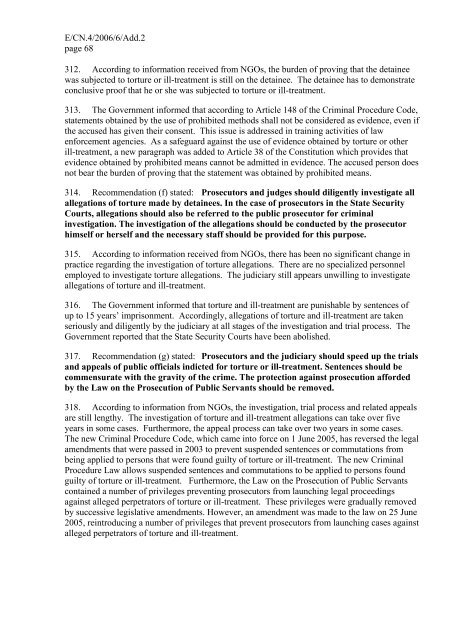E Economic and Social Council - acnudh
E Economic and Social Council - acnudh
E Economic and Social Council - acnudh
You also want an ePaper? Increase the reach of your titles
YUMPU automatically turns print PDFs into web optimized ePapers that Google loves.
E/CN.4/2006/6/Add.2<br />
page 68<br />
312. According to information received from NGOs, the burden of proving that the detainee<br />
was subjected to torture or ill-treatment is still on the detainee. The detainee has to demonstrate<br />
conclusive proof that he or she was subjected to torture or ill-treatment.<br />
313. The Government informed that according to Article 148 of the Criminal Procedure Code,<br />
statements obtained by the use of prohibited methods shall not be considered as evidence, even if<br />
the accused has given their consent. This issue is addressed in training activities of law<br />
enforcement agencies. As a safeguard against the use of evidence obtained by torture or other<br />
ill-treatment, a new paragraph was added to Article 38 of the Constitution which provides that<br />
evidence obtained by prohibited means cannot be admitted in evidence. The accused person does<br />
not bear the burden of proving that the statement was obtained by prohibited means.<br />
314. Recommendation (f) stated: Prosecutors <strong>and</strong> judges should diligently investigate all<br />
allegations of torture made by detainees. In the case of prosecutors in the State Security<br />
Courts, allegations should also be referred to the public prosecutor for criminal<br />
investigation. The investigation of the allegations should be conducted by the prosecutor<br />
himself or herself <strong>and</strong> the necessary staff should be provided for this purpose.<br />
315. According to information received from NGOs, there has been no significant change in<br />
practice regarding the investigation of torture allegations. There are no specialized personnel<br />
employed to investigate torture allegations. The judiciary still appears unwilling to investigate<br />
allegations of torture <strong>and</strong> ill-treatment.<br />
316. The Government informed that torture <strong>and</strong> ill-treatment are punishable by sentences of<br />
up to 15 years’ imprisonment. Accordingly, allegations of torture <strong>and</strong> ill-treatment are taken<br />
seriously <strong>and</strong> diligently by the judiciary at all stages of the investigation <strong>and</strong> trial process. The<br />
Government reported that the State Security Courts have been abolished.<br />
317. Recommendation (g) stated: Prosecutors <strong>and</strong> the judiciary should speed up the trials<br />
<strong>and</strong> appeals of public officials indicted for torture or ill-treatment. Sentences should be<br />
commensurate with the gravity of the crime. The protection against prosecution afforded<br />
by the Law on the Prosecution of Public Servants should be removed.<br />
318. According to information from NGOs, the investigation, trial process <strong>and</strong> related appeals<br />
are still lengthy. The investigation of torture <strong>and</strong> ill-treatment allegations can take over five<br />
years in some cases. Furthermore, the appeal process can take over two years in some cases.<br />
The new Criminal Procedure Code, which came into force on 1 June 2005, has reversed the legal<br />
amendments that were passed in 2003 to prevent suspended sentences or commutations from<br />
being applied to persons that were found guilty of torture or ill-treatment. The new Criminal<br />
Procedure Law allows suspended sentences <strong>and</strong> commutations to be applied to persons found<br />
guilty of torture or ill-treatment. Furthermore, the Law on the Prosecution of Public Servants<br />
contained a number of privileges preventing prosecutors from launching legal proceedings<br />
against alleged perpetrators of torture or ill-treatment. These privileges were gradually removed<br />
by successive legislative amendments. However, an amendment was made to the law on 25 June<br />
2005, reintroducing a number of privileges that prevent prosecutors from launching cases against<br />
alleged perpetrators of torture <strong>and</strong> ill-treatment.
















